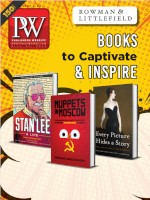In The Viral Underclass (Celadon, Aug.), LGBTQ scholar Thrasher examines how Covid-19 and other viruses expose and exploit systemic inequalities in the U.S.
Who is “the viral underclass”?
The people in society who are most affected by illness, disease, and viruses. Some of these are predictable—those living in poverty and the disabled, for example. But I also include those who are stigmatized and blamed for disease, like immigrants, LGBTQ people, casualties of economic austerity.
What insights into the Covid-19 pandemic did you draw from your research on HIV/AIDS?
This book gave me an opportunity to use the theoretical understanding I’d gotten from studying AIDS for so many years to report on the pandemic. The aha moment was when I saw that the same patterns of spread were developing around Covid. I realized these are the same maps I saw with HIV, even though they are very different viruses.
What does the book have to say about those overlaps?
This book was definitely a way to talk about economics and political philosophy, to say “this is how neoliberalism operates.” That’s a term you hear all the time, and there are all the ways it’s happening during the pandemic. I hope the book will help students and others to see that the pandemic is an illustration of how this kind of system operates.
Why was it important to interweave your firsthand experience of the pandemic with the sociological research?
I like my writing to be welcoming, and I try to bring people along with me. I went through the experiences all of us did, of heading into this pandemic not knowing what was going to happen. I wanted to be vulnerable to the reader to let them see moments I wasn’t an authority, and to benefit from the things I’ve been able to learn, namely how the social and the political and the pharmacological and the activist and the media are all affecting each other.
What do you hope readers take away from the book?
I wanted this to be available to general readers, in particular to people who might consider themselves to be in the viral underclass and people who know the millions who have died in the United States and other countries. Beyond that, I hope there are things in this book that help validate readers’ experiences, that give them ways to think about how the world operates, but also to understand the possibilities that viruses offer us. I don’t feel our country has learned the best lessons it could’ve from Covid, but our opportunities to learn and grow from this are not over. We are in relationship with one another—our fates are interconnected—and we’ll keep having the opportunity to learn from this biological reality. I hope this book helps people think about how they can harness that possibility.



 Volume 269
Issue 25
06/13/2022
Volume 269
Issue 25
06/13/2022





